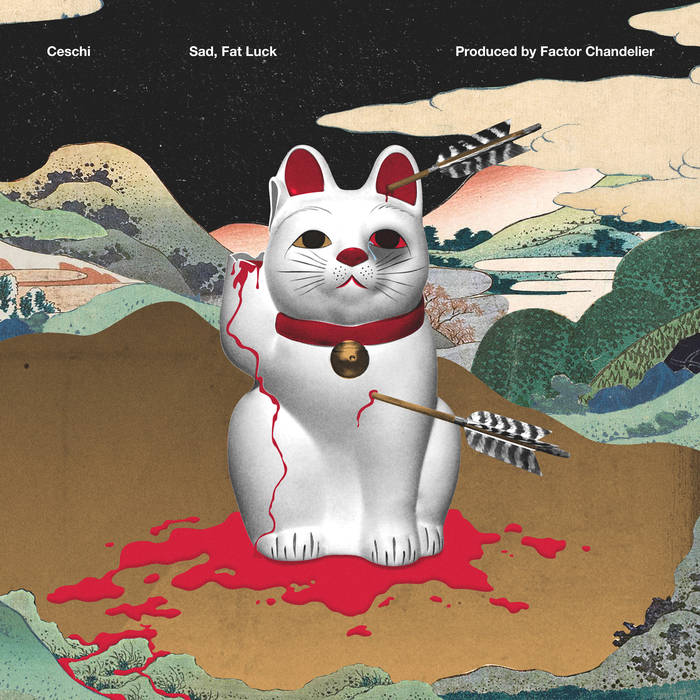Ceschi - Sad, Fat Luck
Written by Chi Chi Thalken on April 4, 2019New Haven artist Ceschi has been carving out a unique path for himself for over a decade, both as a solo artist and as co-founder of the Fake Four label. It’s been four years since he released his last album, Broken Bone Ballads, once of the best albums of the 2010s. After touring extensively, guesting on albums, and running a label, it’s finally time for the official follow up album, Sad, Fat Luck.
Life is unpredictable. After going through hell and finally emerging with Broken Bone Ballads, it felt like life should give Ceschi a break and let things return to normal, at least whatever that means for a touring independent musician running a record label. However, while all the turmoil at large was happening around the world, things were not easy in the world of Fake Four, with a notably huge loss coming when labelmate Sixo unexpectedly passed away last year due to a freak accident. Ceschi knew that Sixo would want Ceschi to keep making music and to keep the spirit of Fake Four alive, so he perservered and put it all into the music. Of course, circumstances are only part of the equation, and in other hands this album could be very uninteresting musically, or the tone could easily have been too dark, or any number of things. Fortunately, Ceschi, and his partner in crime, producer Factor Chandelier, have been working for years to not only make top quality music, but to push the boundaries and blend genres in ways that few come close to. Over the course of Sad, Fat Luck, you get the full range of emotional and musical experiences, brought together in such a way to put everything into a really rewarding conversation. Factor Chandelier has worked with everyone from Def3 to Myka 9 to Kay the Aquanaut and beyond, shaping his style to bring out the best in each artist, but also giving each one a gentle push to try something that might not have accomplished on their own. Ceschi has always occupied this space between singer-songwriter and emcee who sounds like he listened to Elephant 6 and Black Flag as much as he listened to UGK and Freestyle Fellowship, so when he’s working with some like Factor, everything is on the table. When you listen to a song like, “Say No More,” it opens with Ceschi on acoustic guitar, singing a lamentation over the death of a good friend, when a trap beat kicks in and Ceschi’s auto-tuned voice becomes part of the melody behind his voice, before an organ comes into give the song a touch of gospel. When you get to the chorus, there is this cathartic plea to the Lord, when Ceschi and others sing, “Oh, Lord, teach me differences between right and wrong. Oh, Lord, show that you exist at all. Oh, Lord, teach me differences between right and wrong. Oh, Lord, teach me how to exist at all.” It’s a song that really speaks to the way we try to find meaning in the world following an unexpected death, hoping that the universe isn’t just cruel and random and indifferent to all of us. On a song like “Sans Soleil,” Ceschi speaks to the stage of grieving that is anger, lashing out at whatever it is that took Sixo from the world before he could see his daughters grow up. And while this album is largely informed by death, that’s not the only thing about this album. This album is also about living outside of the norm, building community, and fighting for what you believe in. “Take It All Back (Parts 1-4),” opens with a direct reference to “Forever 33” off of Broken Bone Ballads, when Ceschi declares, “On the road again, that was a reference to Cormac McCarthy,” but then goes even harder and deeper as Ceschi raps about his constant struggle against a capitalist racist system in this country, and how he doesn’t know how to do anything but fight for what he believes is right. This theme is revisited upon and then turned up to eleven on “Any War,” which opens with a beat that feels like a march and a sample of Angela Davis, all setting the stage for Ceschi and Astronautalis to give voice to all of those who feel like they’ve been abused by those in power and want to fight back. While these songs might feel like they are covering the extremes of life experiences, there is also room on Sad, Fat Luck for the middle, specifically on “Middle Earth.” That’s right, in the middle of this hip hop album, we get something of an Irish or Celtic folk song, with lyrics about coming to terms with yourself, learning to love yourself, and finding meaning on your own terms, with an especially poignant verse from Sammus (middle children unite!).
Sad, Fat Luck is an album that both hits like a ton of bricks, but also slowly reveals itself and requires multiple listens to unpack everything that is happening. It’s an album that reminds you that while life is never easy, the best we can hope for is to fight for what we believe is right, to find others that feel the same way, and make the best life we can with each other, because life is precious and this world is unkind at worst and indifferent at best.
| Title: | Ceschi - Sad, Fat Luck |
|---|---|
| Label: | Fake Four |
| Year: | 2019 |
| Rating: | 9/10 |

